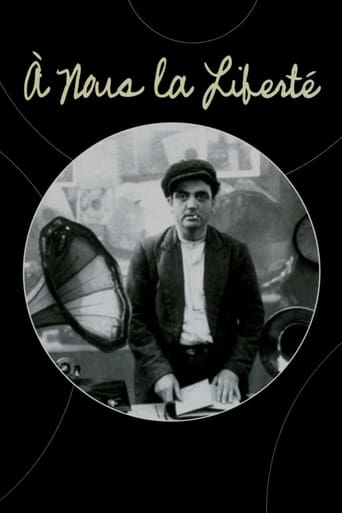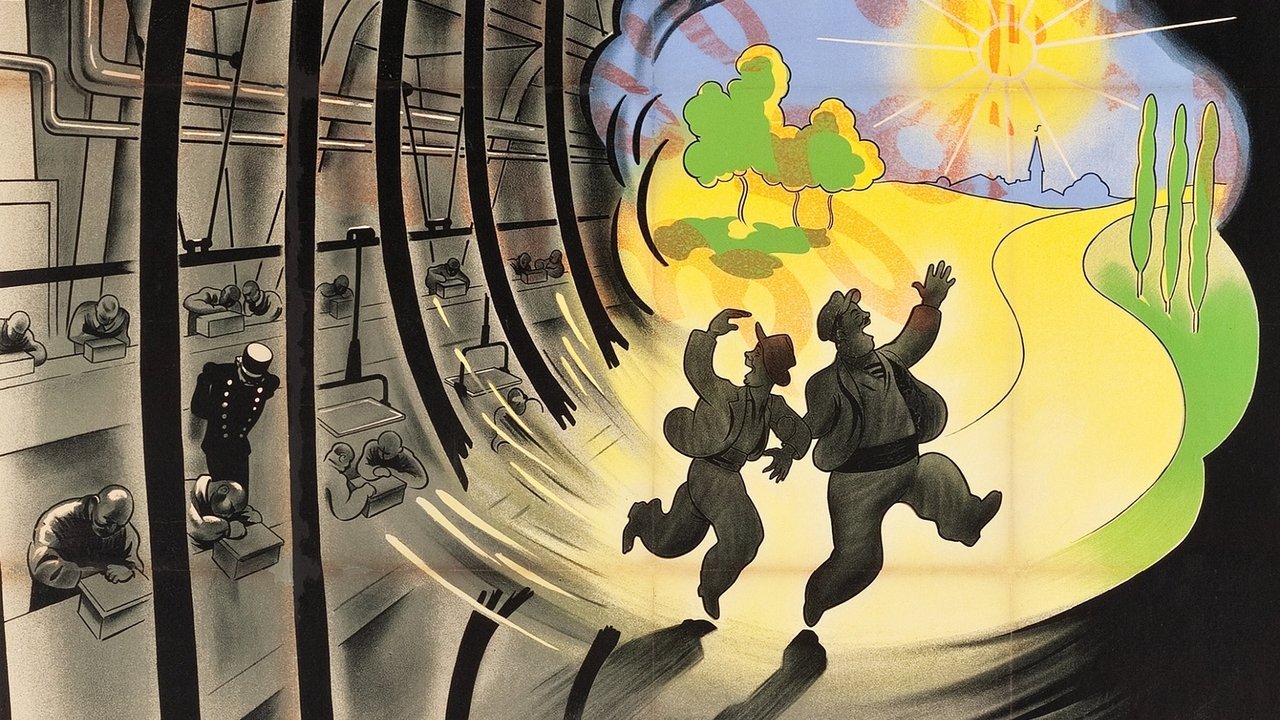Michael Neumann
René Clair's playful machine-age satire owes a large debt to Charlie Chaplin, who later returned the honor by borrowing extensively from Clair's innovative early sound comedy for his own late, great silent feature 'Modern Times'. But Clair went one step further in his original vision of a clockwork society, choreographing his comedy around recurring patterns, synchronized movements, and endless progressions of the type Buster Keaton loved to invent. The timing is precise, the humor is disarming, and Clair's message is simple: mechanical gadgets may be predictable, but human beings most certainly are not, and the awkward alliance between the two can be a fertile source of amusement.I was fortunate to see À Nous la Liberté on the big screen in the mid-1980s (at the Pacific Film Archive in Berkeley), alongside Fernand Leger's famous abstract short 'Ballet Mécanique' (1924): a patchwork of interesting and largely spontaneous visual ideas and juxtapositions.
Hitchcoc
Usually held up as a significant film due to its place between silence and talk, and as an early satire on the burden of the working class, this is certainly interesting. There is symbolism from beginning to end with workers lined up at the gates of factories contrasted with prisoners making little toy horses. One man escapes and becomes a great entrepreneur while his friend is left behind, yearning for freedom. The result is an odd couple. The men eventually work together, but the second man becomes a real liability. I guess we are supposed to see him as a sympathetic care, trying to get the young woman he pines for, but he comes off as a real pain in the butt, messing up just about everything he touches. I am going to say I appreciate the early cinematography and the way the story is told, but I can't say it was terribly engaging. The conclusion with its fishing utopia is just too silly for my tastes.
Michael_Elliott
A nous la liberte (1931) ** (out of 4) I know this film is hailed as a masterpiece and I know Chaplin's Modern Times owes a lot to it but that doesn't mean the film worked for me. Clair's satirical look at factory workers and their owners who are willing to exchange them for machinery is suppose to be a comedy but I'm not sure which part of it is. Having now seen the film for myself, I can see why the original company went after Chaplin because there's no way in hell that this film didn't influence Chaplin and his masterpiece. However, to me it seems Chaplin saw a technically brilliant but soul less film and made a much better picture. Credit should be given to Clair because the technical look of this film is brilliant and the music score is top notch but that's about as far as my admiration goes. There wasn't a single time in this film where I laugh and I only cracked a smile a couple times. The film is clearly spoofing the factory workers yet I could never see any of the spoof Had you not told me this was a comedy then everything on screen comes off as drama because it doesn't seem to me that there was any attempt for laughs. Another problem I had was the dialogue, which was great but at the same time it kind of went against what was going on in the scenes. The movie is filmed in a silent manor and in my opinion it probably would have worked best as a silent movie. The spoken words because somewhat distracting from the technical side of things so it came off to me as Clair was either making a silent film and later decided to make it sound or the film is just uneven.
Nin Chan
This film is feral, anarchic energy, imbued with Clair's keen intelligence and siphoned through crowd-pleasing Chaplin-y slapstick. I am constantly reminded of Jean Vigo's timeless "Conduit Zero" and "L'Atalante" as I guffaw to "A Nous La Liberte"- this one, through the course of a lean, sinewy 83 minutes, deconstructs the wholly arbitrary norms and myths that constitute our mechanized, capitalistic civilization before illustrating just how easily these protocol are upset and subverted. I have learned that Rene Clair had previously lent his hand to the surrealists in the silent era, and that does not surprise me in the least, for this film is, for all its cynical realism, is Surrealist in agenda, a thorough exploration of Liberty.The premise is simple- two convicts escape from prison and pursue vastly disparate avenues outside penitentiary walls. One becomes an unscrupulous opportunist and erects a financial empire, the (rather effete) other is more smitten with a flighty factory girl than money. By a dialectical process the two eventually renounce chimeras like wealth and marriage, opting for a life of Deleuze/Guattari-esquire nomadism, true freedom unrestrained by social expectation. Clair is rarely subtle with his jibes- the factory workers are represented as wholly expendable vessels of labor, weighed and assigned with serial numbers. Their lives are mechanized to the point of eating slop from a conveyor belt. The Paris that Clair evokes is not a romanticised, perfumed city of profusion and resplendence, but a graven concrete sarcophagus, populated with automatons of all varieties. The sole glimpses we get of organic flora are of wretched-looking daffodils, offered to an unappreciative object of affection. Most biting are Clair's sketches of the bourgeoisie, whose cultivated tastes revolve around rumor-mongering, rococo decor and totally maudlin and cloying music. Everywhere carnality peers deviously beneath the gaping crevices, seething and sizzling beneath the Victorian prudishness- look at the rakish dilettante who woos the tycoon's wife, and the virile factory worker who commands the secretary's amorous attentions.Through the course of the film, Clair's intent is in drawing parallels between life in the penitentiary with dehumanizing industrial life and stuffy bourgeois society, illuminating the worrying commonalities that all three share. The conclusive insight, then, is truly surrealist- man constructs his own prisons, circumscribing the possibilities of existence with norms that he then perpetuates with bad faith. When this epiphany strikes our phonograph magnate, he becomes privy to the sheer tentativeness of these stifling dogmas, and engages in a journey towards freedom, culminating in his renunciation of wealth and reputation.The latter half of the film is a STINGING lash against cant and cupidity, and the film reaches a summit in one of the most uproarious and singularly BRILLIANT sections in French film- a fierce gust of wind disrupts an octagenarian's garrulous, grandiloquent (and nauseatingly vacuous) speech, blowing away the elaborate ornamentation adorning the speaker's podium and scattering a profusion of overhead banknotes across the compound. The gathered industrialists resist temptation for a few moments before a madcap scramble for cash ensues, the bumbling old speechmaker struggling to recite his script in the resultant mania, the sole bastion of 'order' in this wild debacle. This is Clair's consummate statement- beneath the ostentation and contrived niceties, we can barely obscure our animalistic greed. The wind blows beneath surfaces and reveals mercenary ardor.A political film that you can show to your kids, as well as a consummate, meticulous masterpiece on par with any Keaton, Chaplin or Tati. Like those artists and Friedrich Nietzsche, Clair knows all about the subversive power of laughter. We must take his approach to life, to nurture the capacity to laugh at all the things we take so gravely, our environs and even ourselves. This is the wellspring of ecstasy and freedom in life. I wonder if Luis Bunuel was a fan...


 AD
AD



